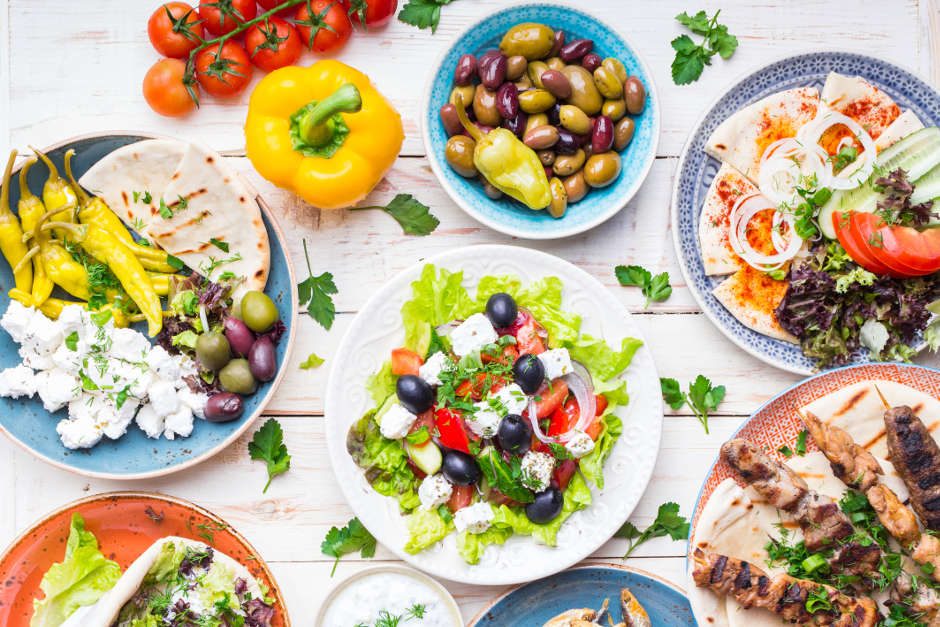Food in Greece follows time-worn traditions handed down over generations amid one of the most continually inhabited places on earth. The country’s rich history, close sense of family, and longtime love affair with the sea make for an approach to cuisine that is flavorful, minimally processed, and distinctly its own.
For the food-loving traveller, it’s worth planning a route through Greece that will serve up the very best – and the most iconic – Greek dining experiences.
Food in Greece – Athens and surrounds
Whether it’s down in the Plaka – old Athens- or in the capital’s newest quarters, you’re never far away from some of the very best food in Greece. While the capital inevitably attracts cuisine from across the rest of the country, the city serves up some tasty treats of its own.
Avoid the tourist traps, where bolshy touts try to harang you through sheer force of will to look at their menu, and head to a quiet local taverna for a plate of Keftedes – deep-fried meatballs made from varying ingredients including fish, cheese, lamb and tomatoes.
Kolokithikia – boiled zucchini doused liberally in quality olive oil, vinegar and lemon juice – is wonderfully fresh and evokes the rustic staples of Greek cooking.
The Peloponnese – olives and aubergines
The Peloponnese – which makes up the southern third of the Greek mainland – offers some of the best food in Greece. Here, olives and aubergines are the stars.
Kalamata olives are famous world over, and the green-gold oil they produce is especially fruity and pungent, perfect for drizzling over salads or adding to a hearty rabbit stifado – a slow cooked stew.
The locally grown aubergines have a reputation for being creamy and larger than the norm. The Tsakonian eggplant garners such reverence that a festival is held every year in its honour, in which established and even amateur chefs use the purple fruit as the key ingredient to wow hungry audiences; it’s Iron Chef Peloponnese style.
The Cyclades – where local is everything
Peppered as they are across the expanse of the Aegean, the islands of the Cyclades have long since adapted to their isolation. Whether it’s Mykonos, Naxos, Paros or Sikinos, each island can lay claim to a robust local culinary culture.
Mykonians make Kopanisti – a locally produced, tart cream cheese made from raw goat’s milk – and serve it straight up on warm slices of pita. It’s the perfect accompaniment to a cold Mythos beer in the Greek summer sun.
On the smaller island of Schinoussa, Mediterranean Octopus is served folded through tiny pasta reminiscent of Fregula from Sardinia.
Seafood plays a significant part in the cuisine of all Greece, yet fish like bream, sardines and cod, as well as octopus, crabs, and mussels, are a staple of the Cycladean diet. No matter what island you’re on, try the local’s version of grilled octopus or fresh fish stew, accompanied by a glass of Athiri (white) wine. It’ll make the everyday grind seem like a bad memory and leave you wanting more.
Crete’s enduring culinary legacy
The traditional Cretan diet is known as one of the healthiest in the world, and it’s easy to see why. Greece’s largest island draws on miles of pristine coastline and a rugged interior strewn with lush valleys to produce simple, hyper-fresh cuisine. A trip to the island’s supermarkets in places like Heraklion and Chania is a real treat – the fresh food section takes up a good half or more of the available floor space, with much of the stock produced by local farms.
Cretan staples include dishes like Dakos – dried bread rusks topped with liberal dashes of Cretan olive oil, diced tomato, soft cheese and garnished with oregano – and Askordoulakous, the bulb of a native mountain green that’s served with minimal fanfare and drizzled with olive oil, lemon and vinegar.
Regardless of where you go, you can be sure the food in Greece will delight in its simplicity and freshness – it certainly is a food lover’s paradise.
For more information Karma’s Greek resorts and estates, visit our Pelikanos and Karma Minonan pages.


Recent Comments